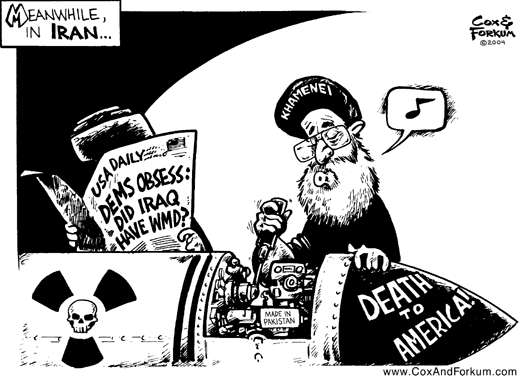Iran has now engaged in a deliberate act of war — casus belli — on numerous occasions against the United States. Most recently it was responsible for critically injuring an American soldier.
Since Hamas’ attack Oct. 7 attack on Israel, estimates run as high as 100 Iranian-backed attacks across the Mideast on U.S. bases, ships, and service personnel.
Iran has acted through its surrogates and proxies, including the Houthis, Iraqi militia, Hezbollah, and others.
Under the laws of war an act of war can be committed by the principal nation itself — which in this case is Iran, or surrogates acting on its behalf — with its approval or support.
There can be no doubt, both as a matter of law and military reality, that recent attacks on American troops, including the one that seriously injured a soldier, are attributable to Iran.
Indeed, the United States has so declared and has responded in what it believes is a proportional manner. Critics of the Biden administration believe this response has been insufficient.
Proportionality in responding to military attacks by attacking the attacking nation’s military, does not require proportionality.
Under international law, as long as the attacks are directed at military targets, the attacked nation may use overwhelming and disproportionate force in order to deter or punish the attacking army.
International law also provides that the counterattack need not be directed specifically at those military targets that were involved in the initial attack.
For example, the United States would be entitled to destroy Iran’s potential nuclear arsenal in response to the attacks directed at American troops by Iran’s proxies.
The question is not one of legality, or even of morality.
Iran has essentially declared war on the United States and the attacked country can respond as it sees fit against Iran’s military or its surrogates.
The question is purely one of strategy, tactics, and diplomacy. Most importantly it involves the decision whether to widen the conflict that Iran began against the United States.
Long ago Iran declared war against Israel, primarily through its surrogates.
It helped arm Hamas, Hezbollah, and the Houthis — all of whom engaged in acts of war against Israel.
Israel is now engaged in an entirely justified all-out war with Hamas.
Thus far Israel has chosen not to attack Iranian targets directly, except in a limited way against members of Iranian-backed militias in Syria and Lebanon. It has also targeted a leading Iranian commander.
But Israel would now be entirely entitled to destroy Iran’s nuclear weapons program which is directed against the nation-state of the Jewish people.
There is new reporting from sources close to Atomic Energy observers that Iran is now once again moving toward developing a nuclear arsenal, having allegedly slowed down the process in the recent past.
In light of the recent failures of Israeli and American intelligence leading up to Oct. 7th, full faith cannot be placed on such reports.
The United States and Israel must assume that unless it is stopped, Iran will soon — how soon is always a matter of degree — have a nuclear arsenal.
Imagine how much more dangerous the world will become if Iran could hand off dirty bombs, tactical devices, and other nuclear weapons to its terrorists, proxies, and surrogates.
The worst must be assumed, and steps must be taken to prevent cataclysmic scenarios.
This is the right time to take such steps against Iran, because the Mullahs have provoked the “big Satan” (the U.S.) and “little Satan” (Israel). Both nations have been their intended targets.
The United States and Israel are now fully justified under the laws of war, and under all reasonable rules of morality, to begin planning a joint attack on Iran’s nuclear capacity.
Both nations, and especially Israel, have an existential need to prevent Iran from developing or acquiring a nuclear arsenal.
It would be far wiser to act too early, as Israel may have done with Iraq, than too late, as we did with North Korea.
The ultimate goal of both American and Israeli foreign and military policy should be a regime change in Iran.
The people of Iran want it, the world would benefit from it, and the United States and Israel would be safer if it could be accomplished.
We have tried other policies, such as negotiation, deal making, economic sanctions, and other forms of pressure. None have worked.
Indeed, the failed American policies have both enriched and emboldened the Mullahs. They understand and appreciate only superior force, which we have but are not using.
This may be our Munich moment.
In the run up to World War II, Western allies, particularly Great Britain and France, sought to negotiate “peace in our time” with Nazi Germany in the hope of avoiding war.
They failed, contributing to the deaths of tens of millions of people.
Had the Western powers attacked Germany before it became strong enough to capture nearly all of Europe, many lives would have been lost in the beginning, but many more would have been saved in the end?
We must not allow these historical mistakes to be repeated, especially in the nuclear age.
Iran must be stopped. It must be stopped now.
And it can only be stopped by the United States and Israel acting together, if possible. If not, Israel will almost certainly have to act alone, because it cannot tolerate even the slightest possibility of a nuclear Iran.
Oct. 7th taught Israelis about the consequences of miscalculation, weakness, and unpreparedness.
The barbarism of that day was only a microcosm of what Israel — and ultimately the United States — could face if Iran and its proxies were allowed to obtain a nuclear arsenal.
Related:




